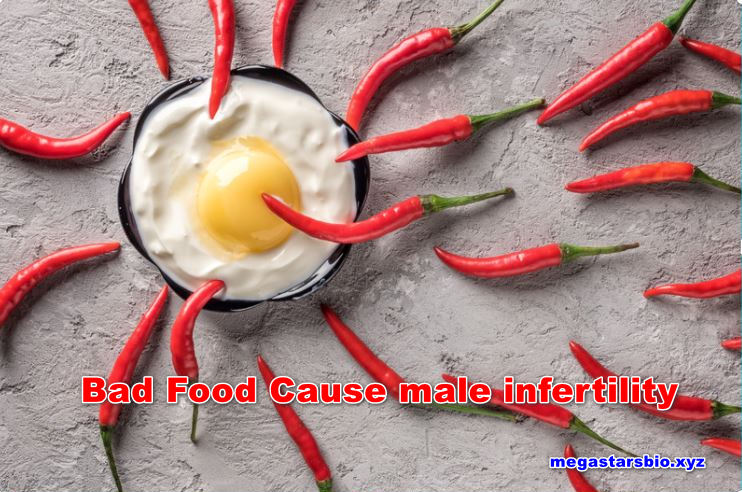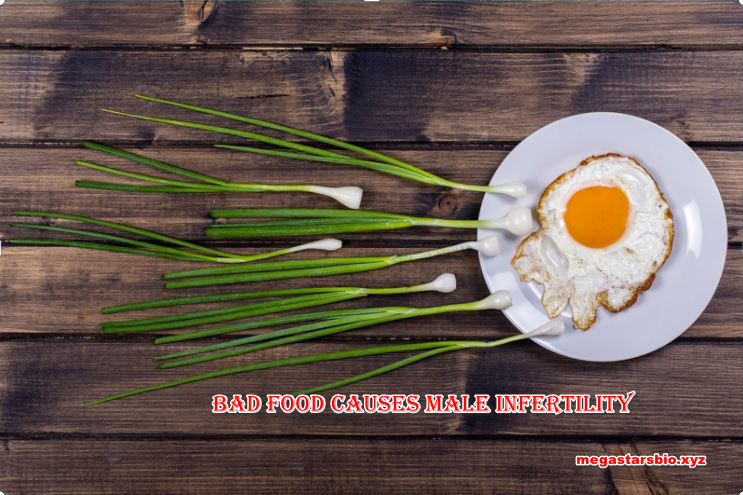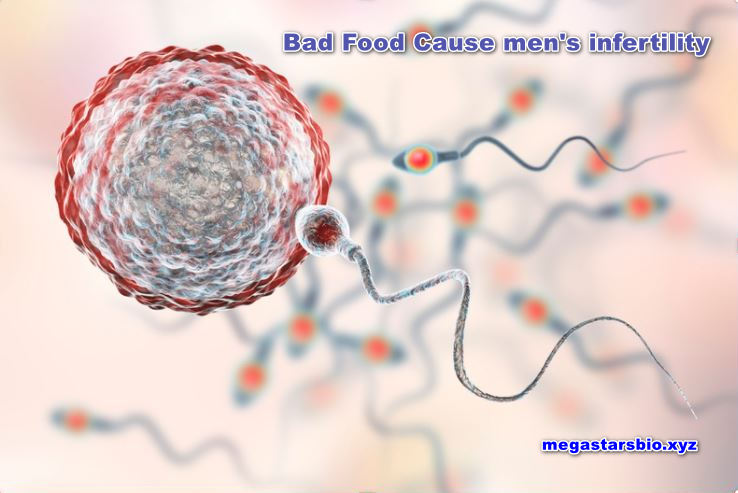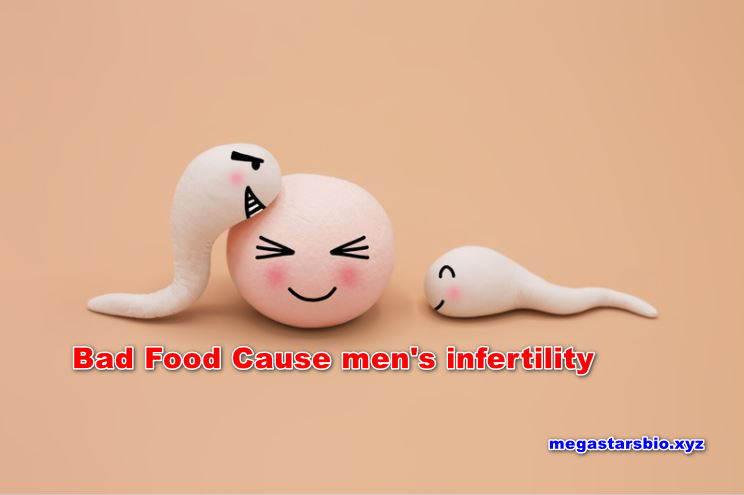Male fertility is declining globally, and recent research highlights a surprising culprit—your plate. While lifestyle factors like stress and lack of exercise play a role, the food you consume daily could be silently damaging your reproductive health. In this article, we break down which foods can reduce sperm quality and count, and offer science-backed tips to protect and boost male fertility naturally.
What foods increase the risk of male infertility? Statistics show that in the last 40 years, the sperm count of men in the world has decreased by an average of 59 percent, which is a very big number and an alert for future generations.
Experts say that this statistic is going to be a headache not only for men but for the whole human society. While there is debate about what exactly causes this, there is no room for debate as to why eating habits play a big role in it. Take a look at what foods increase the risk of male infertility. Which foods are the main cause of Men’s infertility? All those things will be analyzed today in this article. So stay tuned with us.

Table of Contents
📉 The Hidden Crisis: Male Fertility on the Decline
A 2023 global review published in Human Reproduction Update revealed that sperm counts have fallen by over 50% in the last 50 years. Contributing factors include:
- Processed diets
- Endocrine-disrupting chemicals
- Sedentary lifestyles
- Obesity and metabolic syndrome
But the biggest underreported cause? Diet.
❌ Foods That May Harm Sperm Health
Here are a few Foods that can cause the problems. A few food items have been given below which are regularly in our dishes. Check them out.
1. Processed Meats (Bacon, Sausages, Hot Dogs)
Studies show processed meats are linked to lower sperm counts and poorer morphology. Nitrates and high levels of saturated fats in these foods may disrupt hormone levels and sperm development.
According to processed meat experts, processed meat is one of the main reasons for the decrease in sperm count. According to a survey report conducted by the expert, it is very clear that Bacon, salami to dogs, and dogs etc. are made from processed meat. Those who regularly consume this Food can have lower sperm count and be infertile, as per the report.
🧪 Fact: Harvard School of Public Health found men who ate processed meat regularly had 23% fewer normally shaped sperm.

Red Meat, in particular, is responsible for this incident. However, no such result was seen in the chicken. However, researchers are not sure what exactly caused such an incident.
No 2. Dairy products with high-fat content can also cause Men’s infertility.
Currently, the dairy sector uses steroid drugs on cattle to increase milk production. Its effect is also in milk later. The milk of this type of cattle contains a lot of fatty substances. A recent study conducted on 18- to 22-year-olds found that eating such milk and dairy foods had a bad negative effect on sperm motility, speed, and shape, directly or indirectly related to male fertility.

No 3. Harmful fatty acids
Trans fatty acids or harmful fatty acids are considered to be the main cause of heart problems. Current research suggests that such substances are also responsible for lower sperm counts. This type of trans fatty acid causes men’s infertility.

Recommended: How to Lose Body Weight?
No 4. Other chemicals that are involved in Male infertility.

Not just Food, but the type of chemicals currently used to increase ingredients and preserve Food are also responsible for a lower sperm count. Most frighteningly, most foods contain chemicals that are difficult to avoid.
This is all about Men’s infertility caused by the wrong food or a bad diet plan. If you have any of those on your plate, the time has come to kick them out of your life. Please keep in mind that all this information is just for educational purposes; if you have any problems, you must consult your physician immediately.
No-5. Trans Fats (Found in Fried Fast Foods & Packaged Snacks)
Trans fats not only increase cardiovascular risk—they also directly reduce sperm production and testosterone levels.
⚠️ Update 2024: Even minimal trans fat consumption was linked to oxidative stress in sperm DNA in a recent European Society of Human Reproduction and Embryology (ESHRE) study.
No-6. Excessive Soy and Estrogenic Foods
While moderate soy intake may be safe, excessive consumption of soy products (especially isolated soy protein in shakes and bars) can mimic estrogen and potentially lower sperm concentration.
👨⚕️ Pro Tip: Stick to fermented soy in moderation, like tempeh or miso, and avoid overprocessed soy supplements.
No-7. Sugary Beverages and High-Fructose Corn Syrup
Regular consumption of soft drinks, energy drinks, and sweetened teas can impair insulin sensitivity and reduce sperm motility.
🥤 Study Insight: A 2023 study in Andrology linked high sugar intake to a 60% increase in sperm DNA fragmentation—a key factor in infertility.
No-8. Alcohol (Especially in High Quantities)
Excessive alcohol lowers testosterone levels, reduces sperm quality, and affects libido. It can also damage Leydig cells, which produce testosterone in men.
🍺 Note: Occasional moderate drinking may not have a drastic impact, but daily heavy use is strongly discouraged for men trying to conceive.
✅ What to Eat Instead: Fertility-Boosting Foods
- Zinc-rich foods: Pumpkin seeds, chickpeas, and oysters support testosterone and sperm production.
- Omega-3 fatty acids: Found in salmon, walnuts, and chia seeds—help improve sperm morphology and motility.
- Antioxidants: Blueberries, pomegranate, green tea, and vitamin C-rich fruits help fight oxidative stress.
- Leafy greens (like spinach): Provide folate, essential for sperm DNA health.
- Dark chocolate (in moderation): Contains L-arginine, known to support blood flow and sperm count.
🧬 Lifestyle Tips to Support Male Fertility
- Avoid plastic containers: BPA and phthalates from plastics can interfere with hormones.
- Sleep 7–9 hours a night: Poor sleep reduces testosterone.
- Exercise regularly, but not excessively: Moderate strength training and cardio boost fertility.
- Reduce screen time on your lap: Prolonged laptop exposure may increase testicular temperature, lowering sperm quality.
🧠 Expert Insight: Why Sperm Health Matters Beyond Fertility
Healthy sperm doesn’t just impact conception—it affects embryo quality, miscarriage risk, and even the long-term health of your child. Emerging epigenetic research in 2024 shows that poor sperm quality may influence a child’s immunity and metabolism later in life.
Conclusion: Small Dietary Choices, Big Reproductive Impact
Your diet shapes your fertility more than you think. By avoiding foods that harm sperm and embracing a nutrient-rich, balanced diet, men can protect and enhance their reproductive health. Whether you plan to start a family now or in the future, the changes you make today can make all the difference.





